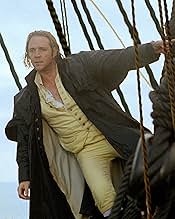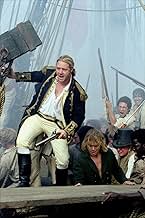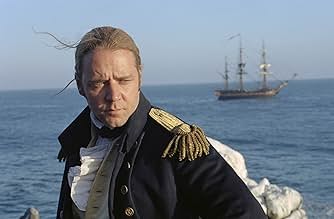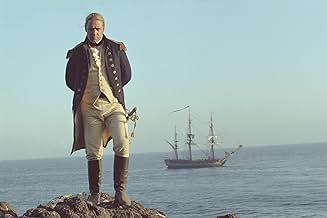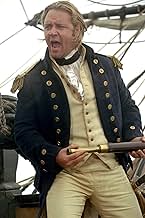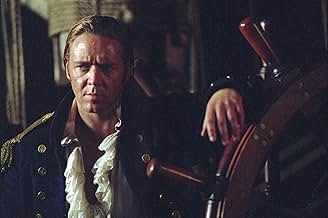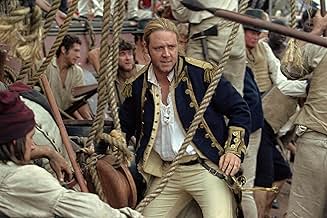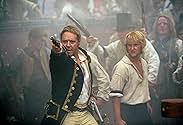Master and Commander: Al otro lado del mundo
Título original: Master and Commander: The Far Side of the World
Durante las guerras napoleónicas, un impetuoso capitán británico lleva su barco y su tripulación al límite en la persecución de un formidable buque de guerra francés por Sudamérica.Durante las guerras napoleónicas, un impetuoso capitán británico lleva su barco y su tripulación al límite en la persecución de un formidable buque de guerra francés por Sudamérica.Durante las guerras napoleónicas, un impetuoso capitán británico lleva su barco y su tripulación al límite en la persecución de un formidable buque de guerra francés por Sudamérica.
- Dirección
- Guión
- Reparto principal
- Ganó 2 premios Óscar
- 23 premios y 90 nominaciones en total
Reseñas destacadas
See this film NOW at the best, state of the art theater you can find. You'll know why five minutes in.
I didn't want to leave the theater when this roller coaster rhapsody to sea soldiery circa 1805 was over. It's stirring entertainment. No love interests needed. This was what it was really like. One ship, 197 men, 4500 miles from home. Chasing a French ship twice her size. No retreat.
Pirates of the Crappy Be-in was a cute romp, but Master and Commander has real ships, real crews, real cannon,convincing characters, historical accuracy and a REAL film director.
Director/ Peter Weir (Witness) has returned big time and, with this one film, revived classic Australian realism, actually surpassing the production values of Peter Jackson's Ring Trilogy. This is not a fantasy film, but history - painstakingly recreated. And rousing history it is, with plenty of action AND robust character development. The adaptation by Weir and John Colley is right on target, brimming with great characters and scenes.
And Russel Crowe? Other than "The Insider", this is his best role ever. Gladiator was just a warm-up. A Beautiful Mind? Well, nice acting from the neck up. Go see this if you want to see both his athleticism and his formidable acting chops! And he decent musical gifts as well (RC studied violin for the role).
I've always thought Weir was one of our great directors. Now he's been given all the toys Peter Jackson enjoys. And Weir uses them to great effect - recreating a nautical reality that lacks nothing except the need to wipe your face every ten seconds. The cutting of Russel Boyd's fabulous photography is perfect. You get to know every inch of the ship, topside and down below. You also get a strong sense of the social dynamics on board - how men got along with each other for so many months. I felt swept along in a perfect mix of virile action and characters I could get to know and care for. One thing I loved was the constant caring between many of the men along the rank and file. There's a strong sense of honor and decency in the film. Yet enough grog flows to keep things loose.
This is vigorous stuff and my most thrilling two hours in a theater for a while. Congratulations to everyone involved.
For now, the best director Oscar goes to Peter Weir over Clint Eastwood (Mystic River)in 2004. Master and Commander is my pick for best picture, just because it is so masterfully realized. A stunning, exhilarating, and - at last - realistic action saga.
I didn't want to leave the theater when this roller coaster rhapsody to sea soldiery circa 1805 was over. It's stirring entertainment. No love interests needed. This was what it was really like. One ship, 197 men, 4500 miles from home. Chasing a French ship twice her size. No retreat.
Pirates of the Crappy Be-in was a cute romp, but Master and Commander has real ships, real crews, real cannon,convincing characters, historical accuracy and a REAL film director.
Director/ Peter Weir (Witness) has returned big time and, with this one film, revived classic Australian realism, actually surpassing the production values of Peter Jackson's Ring Trilogy. This is not a fantasy film, but history - painstakingly recreated. And rousing history it is, with plenty of action AND robust character development. The adaptation by Weir and John Colley is right on target, brimming with great characters and scenes.
And Russel Crowe? Other than "The Insider", this is his best role ever. Gladiator was just a warm-up. A Beautiful Mind? Well, nice acting from the neck up. Go see this if you want to see both his athleticism and his formidable acting chops! And he decent musical gifts as well (RC studied violin for the role).
I've always thought Weir was one of our great directors. Now he's been given all the toys Peter Jackson enjoys. And Weir uses them to great effect - recreating a nautical reality that lacks nothing except the need to wipe your face every ten seconds. The cutting of Russel Boyd's fabulous photography is perfect. You get to know every inch of the ship, topside and down below. You also get a strong sense of the social dynamics on board - how men got along with each other for so many months. I felt swept along in a perfect mix of virile action and characters I could get to know and care for. One thing I loved was the constant caring between many of the men along the rank and file. There's a strong sense of honor and decency in the film. Yet enough grog flows to keep things loose.
This is vigorous stuff and my most thrilling two hours in a theater for a while. Congratulations to everyone involved.
For now, the best director Oscar goes to Peter Weir over Clint Eastwood (Mystic River)in 2004. Master and Commander is my pick for best picture, just because it is so masterfully realized. A stunning, exhilarating, and - at last - realistic action saga.
"Master and Commander: The Far Side of the World" is a very unusual film because the filmmakers obviously were not attempting to make yet another Hollywood style blockbuster. Instead, they seemed to be doing the impossible--make a film that tries very hard to replicate what life was like at sea back during the Napoleonic Wars. As a retired history teacher, this is the sort of stuff I love--even if in the original, the 'bad guys' were actually the Americans and it was set during the War of 1812! I assume they changed the enemy to the French to make the film more marketable. After all, it would be a hard sell in the large American market to get the audiences to root for the British Navy in this altercation! The story occurs around the beginning of the 19th century. The Brits and French have been fighting off and on for almost a decade (and would continue to do so until 1815). The action is set aboard a British Naval ship commanded by Captain Jack Aubrey (Russell Crowe). His ship has encountered a larger and faster French vessel and managed to escape. However, instead of running, Crowe plays a very determined man--and spends much of the film hunting down this ship. Along the way, there are lots of adventures--mostly of the variety you might actually have seen during the era. I could talk about them, but frankly this would spoil the suspense.
Overall, while this film is very slowly and deliberately paced (which will obviously turn off some viewers), the film is so expertly crafted that for a reasonably patient viewer, it should be a very engaging film. The film looks great--with a lot of attention to details and accuracy. It also has the best looking sea footage you can find in a period film--especially when the ship is rounding the Cape (it must have been amazing on the big screen). The acting is lovely as well--understated but quite realistic. Well done in every way and the director really deserves kudos for this one. While I love films from the same period as "Damn the Defiant", "Captain Horatio Hornblower", "Mutiny on the Bounty" and the like, clearly "Master and Commander" is superior when it comes to accurately portraying the life of a seaman.
Overall, while this film is very slowly and deliberately paced (which will obviously turn off some viewers), the film is so expertly crafted that for a reasonably patient viewer, it should be a very engaging film. The film looks great--with a lot of attention to details and accuracy. It also has the best looking sea footage you can find in a period film--especially when the ship is rounding the Cape (it must have been amazing on the big screen). The acting is lovely as well--understated but quite realistic. Well done in every way and the director really deserves kudos for this one. While I love films from the same period as "Damn the Defiant", "Captain Horatio Hornblower", "Mutiny on the Bounty" and the like, clearly "Master and Commander" is superior when it comes to accurately portraying the life of a seaman.
There is a scene in MASTER AND COMMANDER: THE FAR SIDE OF THE WORLD where the captain of a British Naval ship, circa 1805, debates the difference between duty and passion. Having passed on an opportunity to make wonderful new discoveries in favor of the pursuit of a massive French war ship, the scene manages to make a rather eloquent, yet subtle comment on the nature of man and his place within the world. The beauty of this film is that there are many such moments where the viewer is simultaneously bombarded with thematic musings, exciting action sequences, great acting and historical accuracy to the point where it becomes difficult to take it all in at once.
Those of you looking for something more like Pirates of the Caribbean will be disappointed as this film is short on action and long on character development. There are only two major battle sequences, separated by more than an hour and a half of time. And while they are great; violently realistic and dramatically involving, the real guts of this film lies in the human stories told along the way. The director, Peter Weir, highlights his ability to tell an intimate story amidst a grand backdrop much like he did in The Truman Show. We get to know these men, their strengths and weaknesses and we see how the long and hard voyage plays on their minds over the film's progression. In one scene, a young officer feels the pressure of his men's dismissive stares and decides to end matters in his own way, afraid of what may be in store for him should he stick it out. Weir does a good job at highlighting the many facets of seafaring life.
If you're looking for an intelligent and thought-provoking journey into the life of a 19th Century British Naval Vessell, look no further. Master and Commander has the depth of a good Discovery Channel show and the action worthy of almost any other high-seas adventure that comes to mind.
Those of you looking for something more like Pirates of the Caribbean will be disappointed as this film is short on action and long on character development. There are only two major battle sequences, separated by more than an hour and a half of time. And while they are great; violently realistic and dramatically involving, the real guts of this film lies in the human stories told along the way. The director, Peter Weir, highlights his ability to tell an intimate story amidst a grand backdrop much like he did in The Truman Show. We get to know these men, their strengths and weaknesses and we see how the long and hard voyage plays on their minds over the film's progression. In one scene, a young officer feels the pressure of his men's dismissive stares and decides to end matters in his own way, afraid of what may be in store for him should he stick it out. Weir does a good job at highlighting the many facets of seafaring life.
If you're looking for an intelligent and thought-provoking journey into the life of a 19th Century British Naval Vessell, look no further. Master and Commander has the depth of a good Discovery Channel show and the action worthy of almost any other high-seas adventure that comes to mind.
"Master and Commander: The Far Side of the World" is half swashbuckling action movie, half detailed examination of life in the 19th-century British navy, and all entertaining. Director Peter Weir has created an intriguing film that nicely balances fierce battle sequences with quiet, intimate scenes.
Nearly all of the film takes place aboard the HMS Surprise, under the command of Captain "Lucky" Jack Aubrey (Russell Crowe). The captain's orders: to intercept and disable the French privateer Acheron, which is troubling British vessels off the coast of South America. The two ships clash early on, and the Surprise is thoroughly routed--the Acheron is larger, faster, and more modern. But Aubrey, with a determination that might not entirely be due to his sense of duty, is not one to give up, and the Surprise chases the Acheron--and/or vice versa--down the Brazilian coast, around Cape Horn, and to the Gallapagos Islands.
That's the action part. The intimate part involves Aubrey's relationship with the ship's surgeon, Stephan Marutin (Paul Bettany). Stephan is a quiet intellectual and devout naturallist, whose train of thought is foraying into the territory that would make Darwin a household name later in the century. He's also the only one among the crew who's either willing or able to call Aubrey's decisions into question. He provides a grounding force for the captain, and the friendship between these two dissimilar men is the emotional heart of the story.
I've yet to read any of the Patrick O'Brian series upon which "Master and Commander" is based, but the movie shows every evidence of being derived from a painstakingly and meticulously detailed work, one which has gone to great lengths to re-create the world and environment of these men. The details on screen are wonderful, depicting the sort of harsh conditions that make the contestants on those "reality" series look like the overglorified wimps they are. The crew of the Surprise (many of them not older than twenty) lives in claustrophobic and none-too-clean quarters--at times it seems as if every inch of the screen is crammed full--and sleep in hammocks that may very well end up serving as their shrouds. Battles are chaotic, with cannon fire ripping huge holes in the ship and sending shrapnel in every direction. The weather seems to exist only in extremes: still heat, raging tempests, even snow as they drift down near the Antarctic circle. Good service is rewarded with extra rations of grog and brandy, insubordination is punished by the whip. It's a place where both close friendships and deep resentments can grow, and the tension in the air at times feels like a living presence.
Crowe dominates the production, once again proving himself one of the best leading men working in movies. In his hands, Jack Aubrey is a natural leader of men: clever, courageous, determined, and capable of what nowadays is called "thinking outside the box." He is frequently confronted with difficult choices, but takes his responsibilities and the consequences of his actions unflinchingly. Bettany turns in an equally good performance as Aubrey's emotional and ideological opposite; the two men play wonderfully off of each other. Most of the rest of the crew tends to blur together (the exceptions include a young officer who's right arm gets amputated early on, and later takes command of the ship), but "Lord of the Rings" fans will be amused to notice Billy Boyd among the ranks.
The combination of action and introspection in "Master and Commander" at times seems like an odd mix, but the film succeeds on both levels. Definitely a voyage worth taking.
Nearly all of the film takes place aboard the HMS Surprise, under the command of Captain "Lucky" Jack Aubrey (Russell Crowe). The captain's orders: to intercept and disable the French privateer Acheron, which is troubling British vessels off the coast of South America. The two ships clash early on, and the Surprise is thoroughly routed--the Acheron is larger, faster, and more modern. But Aubrey, with a determination that might not entirely be due to his sense of duty, is not one to give up, and the Surprise chases the Acheron--and/or vice versa--down the Brazilian coast, around Cape Horn, and to the Gallapagos Islands.
That's the action part. The intimate part involves Aubrey's relationship with the ship's surgeon, Stephan Marutin (Paul Bettany). Stephan is a quiet intellectual and devout naturallist, whose train of thought is foraying into the territory that would make Darwin a household name later in the century. He's also the only one among the crew who's either willing or able to call Aubrey's decisions into question. He provides a grounding force for the captain, and the friendship between these two dissimilar men is the emotional heart of the story.
I've yet to read any of the Patrick O'Brian series upon which "Master and Commander" is based, but the movie shows every evidence of being derived from a painstakingly and meticulously detailed work, one which has gone to great lengths to re-create the world and environment of these men. The details on screen are wonderful, depicting the sort of harsh conditions that make the contestants on those "reality" series look like the overglorified wimps they are. The crew of the Surprise (many of them not older than twenty) lives in claustrophobic and none-too-clean quarters--at times it seems as if every inch of the screen is crammed full--and sleep in hammocks that may very well end up serving as their shrouds. Battles are chaotic, with cannon fire ripping huge holes in the ship and sending shrapnel in every direction. The weather seems to exist only in extremes: still heat, raging tempests, even snow as they drift down near the Antarctic circle. Good service is rewarded with extra rations of grog and brandy, insubordination is punished by the whip. It's a place where both close friendships and deep resentments can grow, and the tension in the air at times feels like a living presence.
Crowe dominates the production, once again proving himself one of the best leading men working in movies. In his hands, Jack Aubrey is a natural leader of men: clever, courageous, determined, and capable of what nowadays is called "thinking outside the box." He is frequently confronted with difficult choices, but takes his responsibilities and the consequences of his actions unflinchingly. Bettany turns in an equally good performance as Aubrey's emotional and ideological opposite; the two men play wonderfully off of each other. Most of the rest of the crew tends to blur together (the exceptions include a young officer who's right arm gets amputated early on, and later takes command of the ship), but "Lord of the Rings" fans will be amused to notice Billy Boyd among the ranks.
The combination of action and introspection in "Master and Commander" at times seems like an odd mix, but the film succeeds on both levels. Definitely a voyage worth taking.
Few films manage to capture the era in which the original work was set and often rely on clichés of the particular genre at the expense of the core story. This film manages to avoid these pitfalls but more importantly serves as a worthwhile historical document. Anyone who is new to this period of history will not go far wrong keeping a copy of this movie as the attention to detail is excellent and adds to the experience as a whole (teachers take note).
This movie manages to tread a fine line between gritty realism and Boy's Own, portraying the pursuit of an elite French warship by an older embattled British frigate. The production values are very high and the dialogue and length allow the director a better than average framework for character development. The predominantly unknown British supporting cast (some aged as young as 12) are expertly handled and provide a counter balance to the excellent performances of Crowe and Bettany. Crowe's delivery is very reminiscent of Richard Burton, exuding a measured screen presence without overpowering the dialogue.
It would have been easy for the director to read through the salty notes of previous period pieces and deliver the usual tale of ocean going brutality and scurvy encrusted woe but Peter Weir's version of order through respect and camaraderie is far more believable especially when you realize that the sailor's greatest enemy was the ocean itself.
I found little to dislike and much to admire. Highly recommended.
This movie manages to tread a fine line between gritty realism and Boy's Own, portraying the pursuit of an elite French warship by an older embattled British frigate. The production values are very high and the dialogue and length allow the director a better than average framework for character development. The predominantly unknown British supporting cast (some aged as young as 12) are expertly handled and provide a counter balance to the excellent performances of Crowe and Bettany. Crowe's delivery is very reminiscent of Richard Burton, exuding a measured screen presence without overpowering the dialogue.
It would have been easy for the director to read through the salty notes of previous period pieces and deliver the usual tale of ocean going brutality and scurvy encrusted woe but Peter Weir's version of order through respect and camaraderie is far more believable especially when you realize that the sailor's greatest enemy was the ocean itself.
I found little to dislike and much to admire. Highly recommended.
¿Sabías que...?
- CuriosidadesRussell Crowe learned to play violin for the film and referred to it as the hardest thing he'd ever done for a film.
- PifiasDuring the Storm when the Surprise is chasing the Acheron around Cape Horn, Barrett Bonden is shown alone at the wheel. It was customary on a Royal Navy vessel of the time to always have at least two men at the wheel both as a security measure in case one man was injured in battle, and because the rudder itself was extremely heavy and difficult to turn. During any sort of heavy weather there would certainly have been four or more men at the wheel as one man would not be able to control the rudder (which is why the ship has two connected wheels).
- Citas
[Toasting]
Capt. Jack Aubrey: To wives and sweethearts.
Officers: To wives and sweethearts.
Capt. Jack Aubrey: May they never meet.
- Créditos adicionalesThere are no opening credits.
- ConexionesEdited into Spisok korabley (2008)
- Banda sonoraGhost of Time
Composed by Iva Davies, Christopher Gordon and Richard Tognetti
Performed by Iva Davies and Icehouse
Featured Violin Performance by Richard Tognetti
Orchestrated by Christopher Gordon
Selecciones populares
Inicia sesión para calificar y añadir a tu lista para recibir recomendaciones personalizadas
- How long is Master and Commander: The Far Side of the World?Con tecnología de Alexa
Detalles
- Fecha de lanzamiento
- País de origen
- Sitios oficiales
- Idiomas
- Títulos en diferentes países
- Capitán de mar y guerra: La costa más lejana del mundo
- Localizaciones del rodaje
- Empresas productoras
- Ver más compañías en los créditos en IMDbPro
Taquilla
- Presupuesto
- 150.000.000 US$ (estimación)
- Recaudación en Estados Unidos y Canadá
- 93.927.920 US$
- Fin de semana de estreno en EE. UU. y Canadá
- 25.105.990 US$
- 16 nov 2003
- Recaudación en todo el mundo
- 211.623.421 US$
- Duración
- 2h 18min(138 min)
- Color
- Mezcla de sonido
- Relación de aspecto
- 2.39 : 1
Contribuir a esta página
Sugerir un cambio o añadir el contenido que falta







